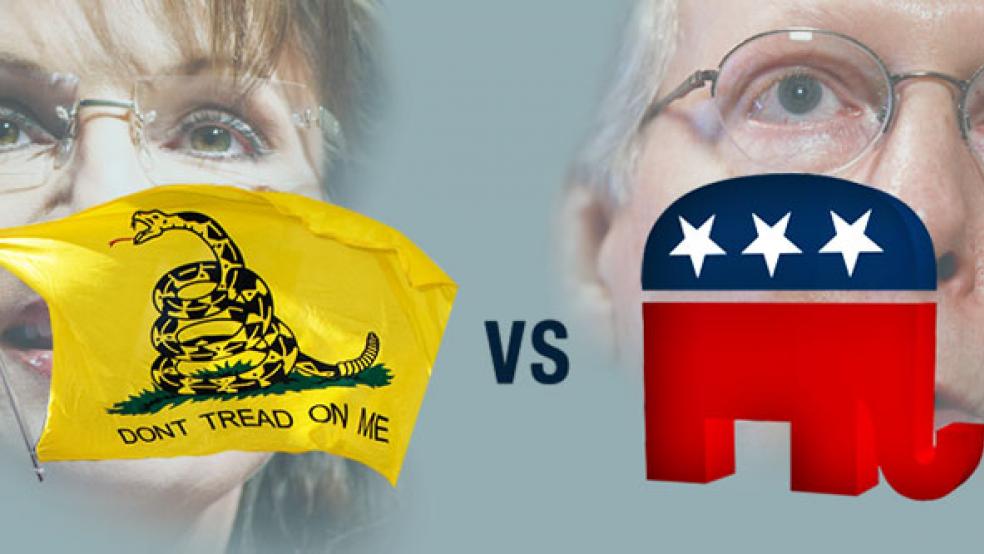There are many important lessons to be learned from Tuesday’s cataclysmic primary elections, such as: We should stop believing the conventional wisdom of the mainstream media; some smug Republicans may be just as vulnerable to defeat as downtrodden Democrats; and there is simply no way to anticipate how this year’s midterm elections will turn out.
Depending on one’s point of view, the Tea Party’s dramatic showing in Delaware and New York – in which prominent establishment Republican figures were toppled by little-known conservative challengers – either signals that the political sky is falling and government is headed for even more political gridlock, if that’s possible, or that the country is undergoing a healthy political sea change born of frustration with government as usual, and that we may be headed for a much-needed reassessment of federal fiscal and social policies.
What happened, of course, is that conservative Christine O’Donnell, blessed by former Alaska governor Sarah Palin, soundly defeated moderate Rep. Michael Castle in Delaware’s Republican Senate primary, while in New York, former Rep. Rick Lazio was toppled by Carl Paladino, a bombastic conservative businessman and Tea Party favorite. Castle, a former governor, was once considered a shoo-in for the Senate seat previously held by Vice President Joe Biden, and Lazio was long considered certain to go up against Democrat Andrew Cuomo in New York’s gubernatorial election this fall.
The results left many establishment Republican leaders stunned and speechless, and, with panic setting in, rank and file Republicans may begin to shift even further to the right to assuage grassroots conservatives. How that will affect the political calculus this fall – and whether it provides President Obama and the Democrats with unanticipated opportunities to make stronger appeals to independents and moderate Republicans – remain to be seen.
A quick survey of Fiscal Times columnists and bloggers for their reactions to primary night turned up a wide range of views, from liberal fear and loathing that the country is headed for a dangerous period of right-wing domination and government gridlock – with no prospects for meaningful budget and tax reform – to conservatives hailing a fresh political breeze coming from the grassroots. Here is a sampling:
--------------------
with one or more government shutdowns a real possibility.”
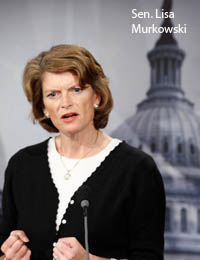 Tuesday night’s primary results point unambiguously to little or no progress being made on the budget over the next two years because Republicans in the House and Senate will have far less ability to compromise on taxes and spending. In light of the Castle and Lazio losses, and following Republican Sen. Lisa’s Murkowski’s primary defeat in Alaska, any GOP senator or representative who even dares to vote for a budget deal with congressional Democrats or the White House – or perhaps even looks like he or she is interested in working with them – has to assume that they will get a well-financed primary challenge from a far-right Tea Party candidate who will use the cooperation as the reason the incumbent should be defeated. Add to that the narrow majorities that will exist in both houses next year (regardless of which party is in control) and you have a recipe for absolute budget stalemate, with one or more government shutdowns a real possibility.
Tuesday night’s primary results point unambiguously to little or no progress being made on the budget over the next two years because Republicans in the House and Senate will have far less ability to compromise on taxes and spending. In light of the Castle and Lazio losses, and following Republican Sen. Lisa’s Murkowski’s primary defeat in Alaska, any GOP senator or representative who even dares to vote for a budget deal with congressional Democrats or the White House – or perhaps even looks like he or she is interested in working with them – has to assume that they will get a well-financed primary challenge from a far-right Tea Party candidate who will use the cooperation as the reason the incumbent should be defeated. Add to that the narrow majorities that will exist in both houses next year (regardless of which party is in control) and you have a recipe for absolute budget stalemate, with one or more government shutdowns a real possibility.
This scenario means that the only improvement on the deficit outlook will come from (1) economic growth, (2) a reduction in the amount of stimulus funds being spent as the program winds down, and (3) a reduction in activities in Iraq and Afghanistan. That will leave a projected deficit of about $1 trillion in fiscal 2012 and an almost guaranteed issue in the presidential election.
-Stan Collender, budget expert and editor of the Capital Gains & Games blog
--------------------
it will be harder to raise taxes to satisfy the call for deficit reduction.”
 The continued success of the Tea party and its deficit hawk rhetoric is worrisome for people like me who believe that we may be headed for an extended period of stagnation. The economy needs more help now to escape that fate, and may need even more later on if the dreaded double dip becomes a reality. I fear the message politicians will get is that deficit hawkishness by any means is what the public wants.
The continued success of the Tea party and its deficit hawk rhetoric is worrisome for people like me who believe that we may be headed for an extended period of stagnation. The economy needs more help now to escape that fate, and may need even more later on if the dreaded double dip becomes a reality. I fear the message politicians will get is that deficit hawkishness by any means is what the public wants.
Whether or not the Tea Party has success in November will push policymakers to the hawkish side on issues related to the deficit. This will make any new initiatives much more difficult to bring about. It will be harder to raise taxes to satisfy the call for deficit reduction; it will be more difficult to protect current programs as deficit reduction efforts get underway, and harder for fiscal authorities to respond to any problems in the economy. And it may be difficult to get anything done at all. If Republicans are successful at the polls in November, and it looks like their chances are pretty good, we can expect mostly gridlock except where the president is willing to compromise key Democratic principles in order to move things forward.
-Mark Thoma, University of Oregon economics professor and blogger, Economist’s View
--------------------
his party and the press from the beginning, at their peril.”
The liberal media is shocked – shocked! – that Paladino toppled Lazio in New York and O’Donnell beat Castle in Delaware. Both victories surprised mainstream pundits, who expected the more moderate and GOP-endorsed candidates to carry the day. 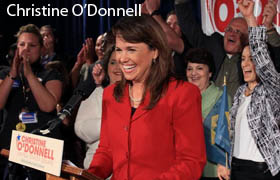 Where have these folks been? When a recent Rasmussen poll says that only 30 percent of Americans think the country is moving in the right direction, do they not understand that voters will hold someone accountable? Starting, arguably, with the election of President Obama, American voters have repeatedly expressed their disgust with establishment politics and politicians – on the right and on the left. They are rightly angry that those in office did not prevent the terrible financial crisis and subsequent recession, and that our leadership seems clueless about how to stop the pain.
Where have these folks been? When a recent Rasmussen poll says that only 30 percent of Americans think the country is moving in the right direction, do they not understand that voters will hold someone accountable? Starting, arguably, with the election of President Obama, American voters have repeatedly expressed their disgust with establishment politics and politicians – on the right and on the left. They are rightly angry that those in office did not prevent the terrible financial crisis and subsequent recession, and that our leadership seems clueless about how to stop the pain.
It is really not so surprising that New Yorkers, who have perhaps the most dysfunctional and corrupt state government in the country (though Illinois gives us a fair chase), who are paying some of the nation’s highest taxes while at the same time witnessing their infrastructure and schools visibly crumble, might warm to a fellow who is angry. Paladino is full of bluster; he’s a bit sloppy and careless, but he channels voter outrage brilliantly. “We are mad as hell,” he says, and many sign on. Besides, Rick Lazio is a decent fellow, but there is not one adult in New York State who thought he might actually beat Andrew Cuomo. Voters rolled the dice with Paladino; as our lottery slogan says … hey - you never know.
O’Donnell’s surprise win owes a lot to the Tea Party, a movement that has been consistently underrated by the liberal media. Democrats cannot believe that all these harmless middle aged Americans are fired up enough to succeed in getting folks elected or policies enacted. You would think that the extremely improbable election of Republican Scott Brown in Massachusetts, a sapphire blue state still mourning their beloved Ted Kennedy, would have opened some eyes. But no – the Tea Party has been dismissed by the president, his party and the press from the beginning, at their peril.
Primary voters of course are different from election voters. There is speculation that greater prudence will accompany Americans to the voting booths in November, and that candidates like Christine O’Donnell will not win over the all-important independents. Our country may decide that taking a chance with an untried candidate is a bad idea.
Americans want progress and they want a bright future. They don’t see our leaders tackling big concerns like joblessness, energy dependence, our trade imbalance with China or our rising budget deficit. Instead, they see our leaders playing political tit for tat, jousting for campaign contributions and creating ghastly complex legislation that few have read and even fewer understand. They are, like Paladino, mad as hell.
-Liz Peek, business and economics columnist, The Fiscal Times
--------------------
is a Republican-controlled Congress.”
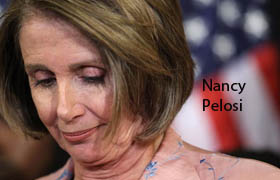 Democrats are cheering the loudest after Tea Party-backed candidates won Republican primaries in blue states Delaware and New York. The chances the Republicans will win control of the Senate are now remote. The likeliest outcome after November will be gridlock with Democrats in control of the Senate and either a Republican-controlled House or one still led by House Speaker Nancy Pelosi, D-Calif., but incapable of passing major legislation.
Democrats are cheering the loudest after Tea Party-backed candidates won Republican primaries in blue states Delaware and New York. The chances the Republicans will win control of the Senate are now remote. The likeliest outcome after November will be gridlock with Democrats in control of the Senate and either a Republican-controlled House or one still led by House Speaker Nancy Pelosi, D-Calif., but incapable of passing major legislation.
That’s bad news for the Democrats' unfinished energy and public works agenda. But it’s good news for deficit hawks, who are convinced that slow but steady economic recovery and fiscal restraint are what’s called for now. It’s also good news for those hoping health care reform will succeed. Since that law is already passed, gridlock is their friend.
The biggest threat to health care reform is a Republican-controlled Congress. Such a majority would put repeal of some if not all of the reforms – coverage expansion, Medicare efficiencies, insurance mandates – on the table. Most of the significant components of the legislation don’t go into effect until 2014 or later. If Congress is deadlocked over the next two years, Republicans will have to make their case for repeal in the context of the 2012 election. If the economy is on the mend by then, as most economists expect, President Obama’s reelection prospects will rise commensurately, and with them health care reform’s staying power.
-Merrill Goozner, health care and economics columnist for The Fiscal Times
--------------------
toward a bipartisan consensus … on reining in the nation's deficits and debt.”
Tuesday's elections – the whole primary season, in fact – are a very bad sign for making any progress toward a bipartisan consensus (or any consensus) on reining in the nation's deficits and debt. Republican voters repeatedly elected not just conservative candidates, but conservatives who signaled they'd never compromise their core principles by making a deal with a Democrat. Now, as Paul Begala pointed out on CNN Tuesday night, it's one thing for Tea Party candidates to win in the "gated communities" of GOP primaries, and another thing altogether to win in the general. So far, the record shows they don't win. But in this season, anything seems possible, maybe even Christine O'Donnell becoming the junior senator from Delaware.
-George Hager, editorial writer for USA Today
--------------------
Who really won Tuesday in Republican primaries across the country? Crusading Tea Partiers with a powerful agenda to reform America and to steer us into a new morning in America?
No. The angries won. The mob. The Jacobins. 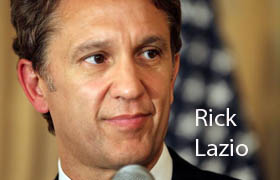 Those Americans are furious that everyone on the planet seems to want to take away their money, their stuff and their way of life during a time of economic upheaval. "Everyone" includes Democrats, moderate Republicans, minorities, President Obama, imams, the Taliban, environmentalists, and on Tuesday, the likes of mild-mannered Mike Castle of Delaware, and the formerly mild-mannered Rick Lazio of New York (who tried to become an angry over the Manhattan Islamic community center controversy, but failed). Both lost in Republican primaries to Tea Partiers.
Those Americans are furious that everyone on the planet seems to want to take away their money, their stuff and their way of life during a time of economic upheaval. "Everyone" includes Democrats, moderate Republicans, minorities, President Obama, imams, the Taliban, environmentalists, and on Tuesday, the likes of mild-mannered Mike Castle of Delaware, and the formerly mild-mannered Rick Lazio of New York (who tried to become an angry over the Manhattan Islamic community center controversy, but failed). Both lost in Republican primaries to Tea Partiers.
Anger can be a powerful weapon for a populace when channeled into something positive or necessary – like throwing off British oppression during the original Tea Party days, or opposing the Vietnam War. Those outbursts of popular anger, however, were driven by intellectual agendas that in one case created America, and in the other corrected a destructive and corrosive policy. Even Ronald Reagan’s campaign in 1980 to counter the “malaise” symbolized and articulated by Jimmy Carter had a governing philosophy beyond anger, whether one agreed with it or not.
What we have now is an angry mob that is against everything without having a clear vision of how they would fix the very real problems we face, or what their morning – or afternoon, or twilight in America might look like. Now the angries have just elected some of their own to stand for election in November to high offices in Washington.
Whether they win depends in large part on more reasonable politicians and leaders standing up to the anger with the sort of patience and confidence that can calm at least some who are really just looking for leadership they can trust. Unfortunately, neither mainstream Republicans nor Democrats seem willing to do this – which undoubtedly will allow a few of the angries to get elected, as the majority of Americans, who are discouraged and even disgruntled but not red-hot angry, stay home in droves.
At some point, the anger will subside. Then we can survey the damage. Hopefully, what comes this fall and in the next Congress will be an angry squall and not a hurricane.
-David Ewing Duncan, author and Fiscal Times columnist
--------------------
on Wall Street who – at least on TV – don’t look any worse for the wear.”
The remarkable string of Tea Party primary victories over establishment Republican candidates is a huge setback for restoring fiscal discipline in Washington. That may sound counterintuitive, since the Tea Party movement has unquestionably been powered in part by deep anger over the big run-up in government spending and deficits.
The problem is that Tea Party’s real fuel is simply anger – anger over the economic shock of a lifetime, over a world turned upside down, over lost wealth and soaring insecurity. And most of all, of course, it’s anger over the smarty-pants know-it-alls in Washington and on Wall Street who – at least on TV – don’t look any worse for the wear.
Primal rage is emotionally satisfying (up to a point), and it’s a powerful force in elections. But it’s toxic for grappling with hard choices, and the nation’s long-run fiscal problems require some of the hardest choices politicians have to make. It’s true that Tea Party candidates all run on the plank of lower taxes and lower government spending. But how many of them would, if elected, actually vote for deep cuts in Social Security and Medicare?
During the battle over health care, conservative Republicans bitterly accused Democrats of cutting Medicare benefits by slashing more than $100 billion in subsidies from Medicare Advantage – insurance plans that work like health maintenance organizations. The subsidies allowed people who subscribed to Advantage plans to get extra benefits than people enrolled in the Medicare’s standard fee-for-service plan. The Democratic bill cut the subsidies by about half to help offset the cost of providing insurance for people who don’t currently have it.
Here is a clip of House Republican leader John Boehner on Fox News last fall, complaining about the proposed cuts: “There are $500 million worth of Medicare cuts over the next 10 years … The most significant change is the $162 billion cut to Medicare Advantage. You know, I’ve got 27,000 Medicare Advantage enrollees in my district, and according to the Congressional Budget Office about 80 percent of them would lose their coverage under this proposal. My seniors love their Medicare Advantage plans.”
Almost everybody agrees that the Federal budget is on an unsustainable path over the long haul. But the only solutions will be deeply unpopular – mostly like a mix of spending cuts and tax increases.
Hammering out agreements will require politically bruising decisions by both political parties. But that in turn requires institutional political strength – leadership in each party that can withstand attacks from important constituencies.
The striking success of Tea Party rebels against more mainstream Republican incumbents only weakens party leaders and makes them even less able to act like the statesmen they will need to be. Instead of serious negotiations over hard choices, Republicans will be under even more pressure than before to resort on simplistic promises about never raising taxes or never cutting extra subsidies for Medicare.
If Democrats are celebrating Christine O’Donnell’s upset primary victory in the Delaware senate race, because the Tea Party candidate is likely to be easier to defeat than Mike Castle of the GOP establishment, they shouldn’t be. Even if O’Donnell loses in November, Democrats are likely to find that it is even harder than before to get anything done.
-Edmund L. Andrews, Fiscal Times senior Washington correspondent
--------------------
wildly successful at feeding the paranoia of some voters and
convincing them the president is responsible for all their problems.”
Mike Castle's loss in Delaware shows that the minority party has been captured by its own minority, with the help of very large amounts of money from sources that can remain anonymous. A lot of it is coming from the Koch brothers, as Jane Mayer shows in her New Yorker story. The damage is being done by the systematic use of big lies focused on Obama. Castle, a true reasonable moderate, is among the victims.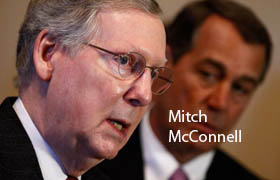 The Kochs want ever lower taxes and ever less regulation and they have been spending millions for years to disguise and legitimize what they want to happen. It's working, and almost no one in the Republican party dares to defend Obama in any way.
The Kochs want ever lower taxes and ever less regulation and they have been spending millions for years to disguise and legitimize what they want to happen. It's working, and almost no one in the Republican party dares to defend Obama in any way.
When Sen. Bob Bennett of Utah tried to speak at the Republican convention in Utah, the hecklers shouted, "Bail out! Bail out! Bail out!" He came in third. No one cares that the country might well have been in a big-D Depression without the bailouts Bennett supported. Senate GOP leader Mitch McConnell denies that the stimulus helped-- never mind CBO's analysis to the contrary. All McConnell cares about is defeating Obama and other Democrats and cutting taxes. It's truly remarkable how he could declaim constantly about the dangers of deficits and debt while demanding permanent tax cuts for everyone with no specific proposals for spending cuts.
If the Republicans make major gains in the elections, as everyone thinks they will, and even if they gain control of the House, Obama should once and for all drop any effort at bipartisanship. A totally partisan approach by the Republicans has been wildly successful at feeding the paranoia of some voters and convincing them the president is responsible for all their problems. At this point, Obama should use whatever power he has to respond in kind. It's only too bad he ever tried to be reasonable.
-John M. Berry, Fiscal Times columnist

